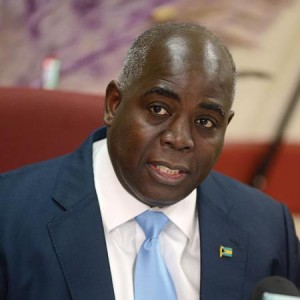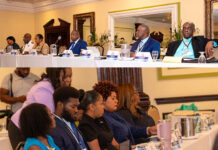COMMUNICATION
BY
HON. PHILIP E. DAVIS, Q.C.
MEMBER OF PARLIAMENT
(CAT ISLAND, RUM CAY, AND SAN SALVADOR)

DEPUTY PRIME MINISTER
AND
MINISTER OF WORKS & URBAN DEVELOPMENT
CONCERNING
THE SELECTION OF THE PREFERRED BIDDER FOR MANAGEMENT OF THE NEW BAHAMAS ELECTRICITY CORPORATION
WEDNESDAY, 13th MAY 2015
HOUSE OF ASSEMBLY
COMMONWEALTH OF THE BAHAMAS
NASSAU, NEW PROVIDENCE
Mr. Speaker
On Thursday, 30th April 2015, I announced the selection of PowerSecure International, Inc. as the preferred bidder to manage the New BEC, both generation and transmission/distribution, for a period of five (5) years, subject to the negotiation and finalisation of the management contract, the major terms of which have been agreed.
This decision was taken in consideration of the unanimous recommendation of the Task Force appointed to review the proposals and its financial advisors, KPMG Advisory Services, technical advisors, DNV GL, and as a result of an extensive, robust, and patient request for proposal (RFP) process.
Mr. Speaker
The National Energy Policy 2013-2033 identified six (6) priority areas to guide us to sustainable energy reform. The cited areas are:
Security of energy supply through diversification of fuels;
Modernising of the energy infrastructure;
Development of renewable energy sources such as solar, ocean energy, biofuels, waste-to-energy and wind;
Energy conservation and efficiency;
Development of a comprehensive governance/ regulatory framework to protect the consumer, effectively support the advancement of the energy sector, and to facilitate the introduction of renewables and the diversification of fuels; and
Eco-efficiency in the manufacturing, agricultural and tourism sectors and government as leaders in energy conservation and the use of renewable energy.
Mr. Speaker
A key step toward reform is the restructuring of The Bahamas Electricity Corporation (BEC), to create efficiencies which will allow for significant reductions in the cost of energy, reliability of service, increased energy security, and environmental responsibility. All of these will assist The Bahamas’ to meet the articulated goal of a modern, diversified and efficient energy sector, which provides Bahamians with affordable energy supplies, thereby enhancing our international competitiveness and sustainable prosperity.
We are well on the road to fulfilling our Charter for Governance commitment toward ensuring a positive bottom-line effect on the pockets of the average Bahamian and business owner. We have taken very deliberate steps to get to this point. The Amendment to the Bahamas Electricity Act, which we delivered earlier this year, was critical to what we do now.
Mr. Speaker
The RFP for the Management of BEC was issued in August 2013 and advertised widely in The Bahamas and internationally. From the RFP, we sought to ultimately identify a suitable company to manage all functions of the existing BEC under a new structure. That company would, to the extent required, bring access to capital for investment in the generation side of the business, as a partner to the Government. Further, the company would assist us in addressing the significant legacy liabilities of BEC totalling more than $450 million in an efficient manner, facilitating BEC’s capacity to invest in much needed new equipment. These legacy liabilities include bank debt and bonds, overdue payables, a deficit of the pension plan, and environmental liabilities (not yet quantified) as well as restructuring costs going forward.
As the process evolved, taking into account various challenges, in particular, the issue of restructuring the large amount of legacy debt, the structure was adjusted such that the relevant assets (excluding land) and business of BEC would be transferred to a single entity, the New BEC; and Government would itself procure offers for the refinancing of the legacy debt.
Mr. Speaker
It is important to note the key components that brought us from the initial 13 bidders of August 2013 to this point. By 13th September of that year, nine (9) bidders submitted technical proposals. Three (3) of the bids were rejected. By 15th November, five (5) of the remaining bidders submitted pricing proposals; and on 24th December, each were asked for further particulars of their proposals.
On 31st January 2014, four (4) bidders submitted revised pricing proposals. Each of them, in February and March of 2014 made presentations to the Task Force that included representatives of the Office of the Prime Minister, Ministry of Works, Ministry of Environment & Housing, the Attorney General’s office along with the Government’s advisors.
From April to July, the Task Force and the Government’s advisors undertook a detailed assessment of bid proposals and alternatives put forward by bidders. In accordance with the process, the Task Force made recommendations to Cabinet on the next steps and for the refinancing of the legacy debt.
On 29th August 2014, three (3) bidders were invited to a final round of evaluations. These evaluations included site visits by a Government delegation to bidder facilities over the period September to November 2014. Negotiations on management contract terms were pursued in earnest and finalised during November and December 2014.
Mr. Speaker
When Government set out in pursuit of a Manager for BEC, we were firm in the criteria for the preferred bidder. We sought out the company best able to extract value from the existing New Providence generation assets including advanced asset management, efficiency retrofits, improved operating schemes, fuel selection and purchasing schemes, effective supply chain, emergency response planning, preparation and execution, and training employees in proper maintenance techniques.
As well, the company had to have the ability to manage the building of new major generation in New Providence including objective development and financial evaluation of options, design and engineering capabilities, managing construction on time and on budget, operating the selected option, and optimising fuel source for the selected option.
Further, the company had to have the ability to extract value from existing assets on the Family Islands, including advanced asset management and fuel selection and purchasing schemes.
In respect of both New Providence and the Family Islands, the company had to have the ability to procure and/or manage the building of renewable energy projects supplemented with selective replacement of fossil fuel plants, including control schemes and integration system design, small fossil fuel installation experience, and renewable generation experience.
We also determined that the company must have the ability to improve the availability and reliability of the transmission and distribution systems to improve efficiency through state of the art asset management, planning for system and capacity expansions to meet new and increasing loads, use of live line maintenance and construction methods, effective supply chain, emergency response planning, preparation and execution and training of employees in proper construction and maintenance techniques for line and station work.
We deemed it necessary that the company demonstrate its ability to effectively manage the customer services functions including advanced metering infrastructure, to include pre-paid metering, the ability to detect theft, and the ability to remotely connect and disconnect power. Other modalities would include effective management of the bill rendering cycle, the collection cycle, and efficient management of service requests and the call centre function.
Mr. Speaker
The success of any company is commensurate to the efficiencies of its staff. It is therefore an imperative that the company commit to proactive management relationships, including employee and union relations and community interface. This commitment requires the incorporation of a Health and Safety programme to include safety rules and policies, energy control (switching & tagging) functions, safety training, and field audits of work.
While these were the overarching criteria for the RFP, it is given that the company must align itself with and support the realisation of Government’s National Energy Policy goals and objectives; and set out an overall strategy for sustainable cost reduction without compromise to reliability and the environment. The company is also required to be equally sensitive to the diverse needs of the Family Islands and articulate a strategy to meet those needs.
Mr. Speaker
PowerSecure, a public company in the United States of America, is traded on the New York Stock Exchange (NYSE: POWR), which is regulated by the Securities and Exchange Commission (SEC). Extensive information concerning its ownership and activities is available on line for any interested party. However, I am pleased to read its credits into the record of this House.
PowerSecure is widely held with no single controlling shareholder. Headquartered in Wake Forest, North Carolina, it has total assets of $265 million, shareholders’ equity of $157 million, trailing twelve month revenues of $283 million (to 31st March 2015) and market capitalisation of $318 million (11th May 2015). It has grown considerably over the last several years, posting on average over a 25% Compound Annual Growth Rate (CAGR). In addition, based on its most recent investor presentations last week, it holds a strong contract backlog of $402 million. Indeed, since January 2014, it has announced more than $400 million in new business.
As at 15th March 2015, it was 95% owned by institutional and mutual fund owners. The company’s largest shareholder is Wellington Management Company, an investment manager with $900 billion under management. Other notable shareholders include Dimensional Fund Advisors, SRB Management, Blackrock Fund Advisors, Vanguard Group, AWM Investment Company, Becker Drapkin Management and other major, primarily US-based institutions and funds.
PowerSecure’s 33-year energy veteran and Founder, Mr. Sidney Hinton, serves as its President and CEO. Prior to establishing PowerSecure he worked for Carolina Power & Light (now Progress Energy), Southern Company and Georgia Power Company. Under his leadership at PowerSecure, close to 1,000 employees across the United States operate and maintain approximately 1 GW of Distributed Generation capacity. It reported 98.4% reliability for these systems in 2014, which is one of the best in the industry. Its three-prong operations take in Utility Services (engineering and infrastructure solutions), Power Generation (distributed energy and solar installation and management) and Energy Efficiency (including production of its own LED lighting systems). The company serves many of the largest utilities in the United States.
PowerSecure specialises in Utility Scale Solar Power through its subsidiary PowerSecure Solar; and has provided both solar and storm hardening services to multiple utility customers. Of particular note is its efficient mobilisation of resources for every named storm in the US in the last 5 years. As recently as January this year, it mobilised utility support during the severe weather and snowstorms in the Northern United States. It also performs rate and cost of service analysis studies, and an entire array of system studies using the latest technology. It has completed hundreds of projects for utilities, industrial and government organisations, and other specialty clients.
Mr. Speaker
The company’s PowerServices and generation group has a team of managers with significant Investor Owned, Co-operative and Municipal Utility managerial experience, as utility directors, senior engineers, and senior VPs of engineering. PowerServices provides traditional electrical engineering services to electric utility clients and others. This Government has never questioned the qualification and capability of BEC’s management and staff. We are keenly aware of their material challenges. With this in view, we are confident that the PowerSecure team, in consultation with experienced engineers at BEC, will collaborate effectively to plan, design, procure, and construct generation, transmission, distribution, substation projects, and utility communication projects for the New BEC.
PowerSecure’s Utility Engineering division provides engineering, project and construction management, and quality control services for turnkey design/build (EPC) utility infrastructure projects, along with testing and commissioning for an array of power delivery and SmartGrid systems. Its team has completed projects for private and public entities, including the U.S. Navy, U.S. Army, U.S. Air Force, Department of Veteran’s Affairs, NASA, and both large and small industrial clients and utilities.
Mr. Speaker
The selection of the new manager is the primary step in the overall restructuring of BEC and reform of the energy sector. We have now turned our attention to the next steps, which include the finalisation of the management contract with PowerSecure. At the same time, we are in the process of establishing a Transition Committee as per the agreement. This Committee will consist of well-versed business and technical persons. The Business Plan will be a Contractual document once approved by the Board of the New BEC and the quantum of the Management Fees will be tied to meeting the targets set out in the Business Plan. The Task Force is also in the process of considering and recommending on several robust proposals submitted by world class Banks to raise monies by way of Rate Reduction Bonds. In the near future we also expect to enter into a Rate Reduction Bond mandate with a preferred bank(s) for the refinancing of the legacy liabilities, without a Government Guarantee as well as providing monies for the working capital and other needs of the New BEC.
At the satisfaction of these requirements, Government will table legislation to establish the New BEC, transferring the operating assets and certain liabilities from the existing BEC to this new company. That legislation will establish a completely new and non-partisan Board to oversee the management contract and operation of New BEC.
With its credits, the Government of The Bahamas is satisfied that PowerSecure has the technical, operational and financial capacity required to manage the New BEC.
Mr. Speaker
We sincerely thank those bidders that were not selected for their broad engagement, contribution to the process, professionalism and patient tolerance of the process. We especially thank our technical and financial advisors, and the Government Task Force, who have all undertaken extensive due diligence on the existing financial and operational conditions at BEC, the various bidders and all of the options put forward by those bidders.
With confidence, we now look forward to the establishment of the New BEC under the supervision of PowerSecure. As promised, we are well on the way to delivering to our constituents a 100% Bahamian owned, world class electrical utility, offering its customers affordable and reliable power, and a tremendously improved customer service.
As the transition unfolds, I commit to bringing further updates to this House. In the meantime, we encourage all stakeholders to remain steadfast in their work toward the goal of more efficient, more reliable service at a more cost effective rate.
Thank you, Mr. Speaker.







